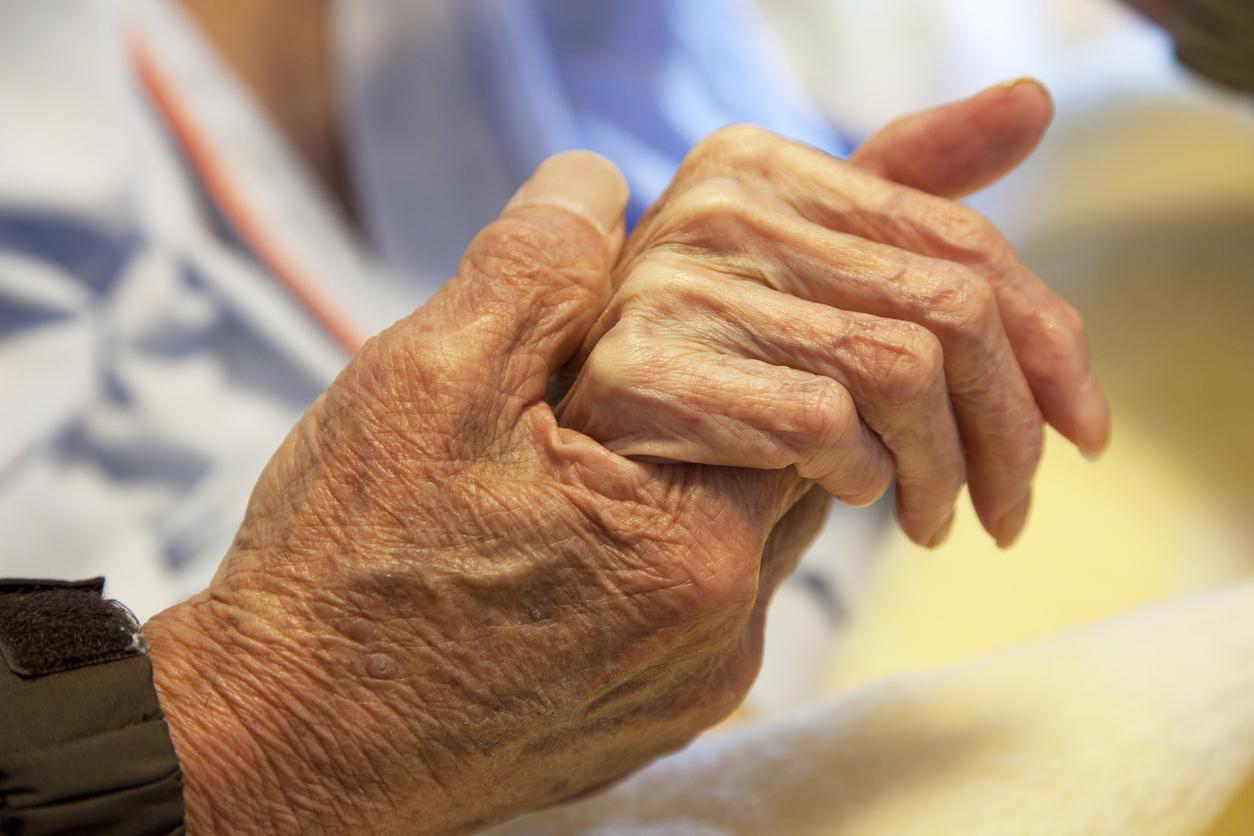
And yet you want to celebrate Christmas
If your partner is chronically ill, you suffer. But you can also positively influence the course of the disease. So much so that your partner lives longer.
She thinks: “Why did he load such a huge piece of pudding on his plate? Doesn’t he know that his blood sugar gets out of control? The doctor told him to be careful. But I’ll keep my mouth shut. If I say something about it, he gets irritated and the atmosphere is spoiled.”
He thinks: “I’ve been looking forward to that blueberry pudding all year. This one time I’ll take a big chunk, it’s only Christmas once after all. I just hope Mirjam doesn’t get it on her hips. Maybe I should have told her I shot extra insulin so I can have that pudding.”
You do not have diabetes alone, as the Dutch Diabetes Association says. This applies to many more chronic diseases. But as a partner you not only suffer, you can actually influence the course of the disease.
talk courage
Two years ago, Loes Baars-Bicker’s husband (54) was diagnosed with heart failure. He has to take a load of pills every day, is only allowed to drink a liter of fluid a day, is often short of breath and always tired. Not only his life was turned upside down, her own life also changed drastically. “We’ve both been depressed for half a year. Death suddenly came very close.”
50 percent of heart failure patients die from sudden cardiac arrest within five years. Loes: “During the first year I came home from work every day with fear and trembling: later I will find him dead in bed.”
Since her husband has an ICD, a device that continuously monitors the heart rhythm, she goes out a little more relaxed. “But the phone is always with me. I am always on alert.” She tries to support her husband as much as possible. “I fill his pillbox every week, because all those different medicines drive him crazy. I go with me to the hospital and give him courage when he is having a hard time.”
Less stress
Talking together about the consequences of the disease, offering a listening ear, going to the hospital, taking jobs off your hands: all things that make Loes’ husband feel like he’s not alone. Research shows how important this is: chronically ill people who feel supported by their partner suffer less from depressive symptoms.
That sounds very logical, but the influence of the partner goes further. The partner can even influence the course of the disease: for example, heart patients who feel emotionally supported by their environment live longer than others who lack support. They take better care of themselves, take their medicines more faithfully, and suffer less from stress.
The partner’s views on the seriousness and consequences of the disease are also important. Mieke Cardol discovered that if the partner thinks much more lightly about the disease than the patient himself, this can have a negative effect on the course of the disease. She is a senior researcher at Nivel, the Dutch institute for health care research. She conducted research into patients with type 2 diabetes – formerly also known as old-age diabetes – and their partners. Cardol: “In the past, doctors thought that type 2 diabetes was not that serious. It is now clear that this is not true: the risk of cardiovascular disease is particularly high in people with type 2 diabetes. But partners often think: oh well, a little sugar, that’s not too bad. That thought can be very harmful. Our research shows that there is a link between higher blood sugar and a difference in attitudes between partners.”
She thinks this has to do with stress: disagreement causes stress and stress affects blood sugar levels. That is why she believes that partners of diabetes patients should be more involved in education about the condition.
Overprotective behavior
In the case of diabetes, information to the partners of the patients is still rare, in heart failure this happens more often. In the St. Antonius Hospital in Nieuwegein, for example. There, Jet Tammeling, medical social worker in the cardiology department, supervises patients with heart failure and their partners. “The disease is very serious. For the partner, the idea that the patient could suddenly die is often even more anxious than for the patient himself.”
Especially in women, this fear often leads to overprotective behavior. “Male partners focus mainly on practical things. They delve into the medicines, arrange a mobility scooter and drive their wife to the hospital. Women are much more concerned; who take the disease on their necks. That leads to irritation. I even see women going to feed their husbands when he’s in the hospital. As if someone with heart problems suddenly can’t do anything anymore.”
She understands very well that many women have a tendency to control their husbands. “Especially when they see that he doesn’t follow the rules very closely. They are so afraid of things going wrong that they want to do everything they can to prevent it. Usually that doesn’t work.”
Treat your sick partner as someone who is responsible for his own health, Tammeling tells partners. “Loss of control is one of the hardest things for people with heart failure. Often they lose not only their health but also their job; sometimes they are not allowed to drive a car. It’s very important that they keep a certain autonomy, that they don’t constantly have a concerned partner panting down their neck.” Patients who feel they are in control of and understand their illness generally feel happier, research shows.
strict rules of life
“It’s always a balancing act between meddling and letting your partner go free,” says Karel Spaas (62). His wife Magda has had diabetes since she was 11 and has to inject insulin twice a day. Spaas: “I can now deal with it – after 37 years of marriage.” He still finds the hypos (abnormal drop in blood sugar resulting in physical complaints such as sweating, trembling, headaches, dizziness) that occasionally attack his wife at night anxious. “I pay extra attention during such a period. How are her eyes? Does she perspire more than usual? That could be a harbinger of a hypo. But I know I should never say to her, do you have your glucose with you?”
Fortunately, his wife adheres to the strict lifestyle rules for diabetes patients, he says. “I can trust her blindly.”
In the past he could sometimes be reproachful if she had had a hypo again: shouldn’t you have eaten something in time? Spaas: “That was very annoying for Magda. Making an error of judgment is human, as a partner you have to accept that.” At times when her blood sugar is out of control, he helps his wife measure and they discuss what she could do. “But she decides. It’s your diabetes, I always say.”
Keeping a sense of humor
“It’s not always that simple,” says Bep van Houten (54). Her husband Hans – “a stubborn Frisian” – has been a diabetes patient for thirty years. “Because of the disease, his sense of hunger has decreased significantly. He no longer feels when to eat. There is always a chance that he will get a hypo.” She has arranged with her husband to measure his blood sugar level before he cycles home from work. “Sometimes that goes wrong and he crashes because he didn’t measure.”
This is not due to her husband’s unwillingness, she explains. “If his blood sugar is too low, it also affects his mind: similar to someone who is intoxicated. Hans then becomes overconfident, feels fine and just cycles home.” When he is in such a state, it takes a lot of persuasion to get him to eat something. Bep: “Then he gets angry: how come, leave me alone. Only when he has eaten something does it recover. You should have heard yourself, I say. The important thing is that you keep your sense of humor and take a step back every now and then. When my husband acts unreasonably, I tell myself: this is not my partner for a while, this is a patient. That helps not to take it personally.”
two way street
Overprotection is always well-intentioned, but usually backfires, says Mariët Hagedoorn. She is professor of health psychology at the University of Groningen and has been researching partners of chronically ill people for years. An overly concerned partner affects not only the mind, but also the body. Diabetes patients with an overprotective partner are less able to regulate their blood sugar levels, Hagedoorn showed in research.
“Sickness is something that happens to you together. You have to deal with it together. Sometimes you have to negotiate, compromise. This applies not only to the partner, but also to the patient.”
Dealing with an illness is a two-way street. Of course you support your sick partner, but the other way around you can also expect some support in return. That is good for yourself, but it also benefits your partner: chronically ill people who not only receive support from their partner, but who can also provide support, feel less dependent. And so you only get smiling faces around the Christmas table.
How do you find a good balance?
Three tips not to patronize your sick partner, but to be involved.
1. Ask what your partner needs
“It’s about giving your sick partner the support he needs,” says Mariët Hagedoorn, professor of health psychology. “Ask your partner that, even if you’ve been together for a long time. Even if you think you know each other well, you could be wrong. In a crisis situation, people can have different needs.”
2. Don’t Force Talk
“Talking only helps if both partners are willing,” says Hagedoorn. “Some people need more distraction; they do not want to be constantly confronted with their illness and fears. You have to respect that. Rather find a good friend to vent your heart out than force your partner to open up.”
3. Take care of yourself too
“Keep doing things that give you energy yourself”, advises Jet Tammeling partners. “Partners sometimes say: if he can’t play tennis anymore, I’ll stop too. You don’t have to be loyal in everything. Ultimately, that didn’t help your partner. On the contrary: patients often feel guilty anyway for turning the life of their healthy partner upside down.”
Sources):
- Plus Magazine














